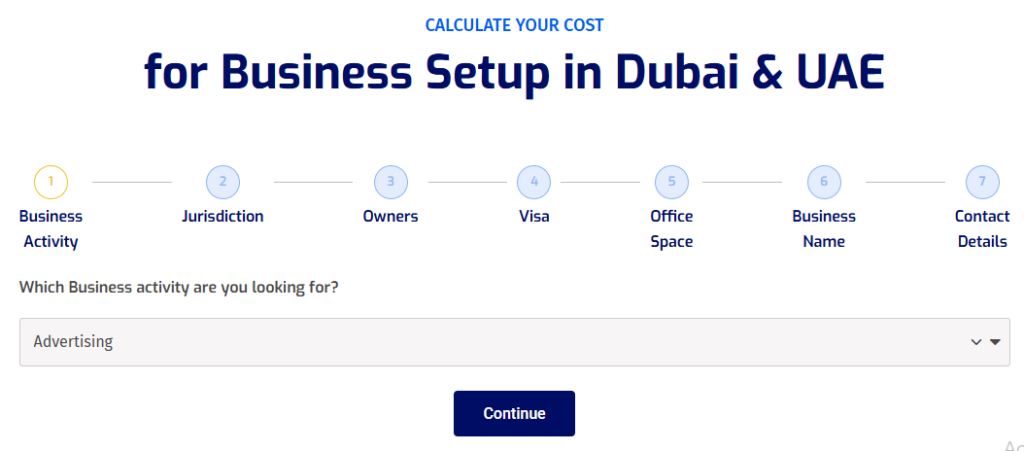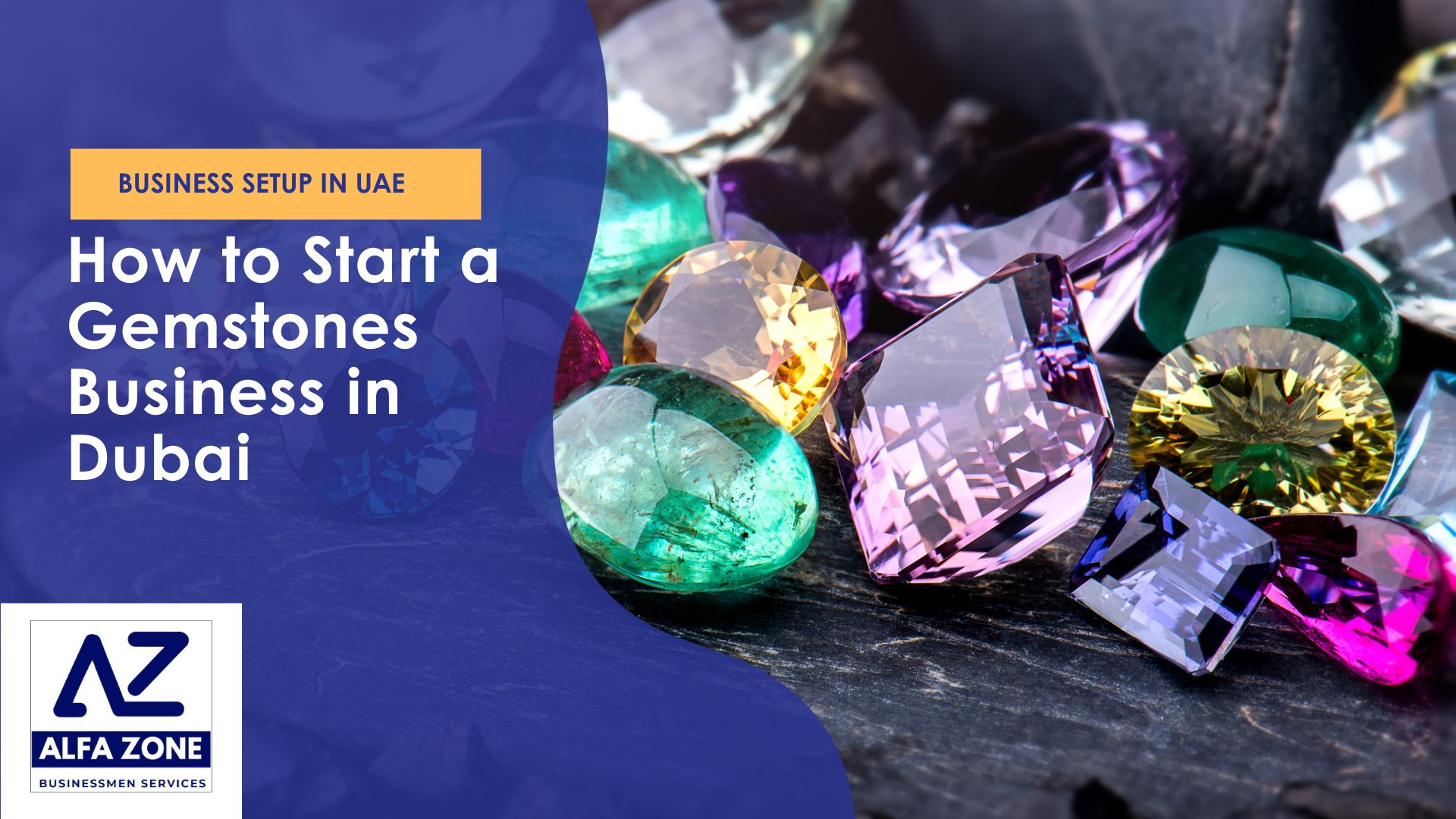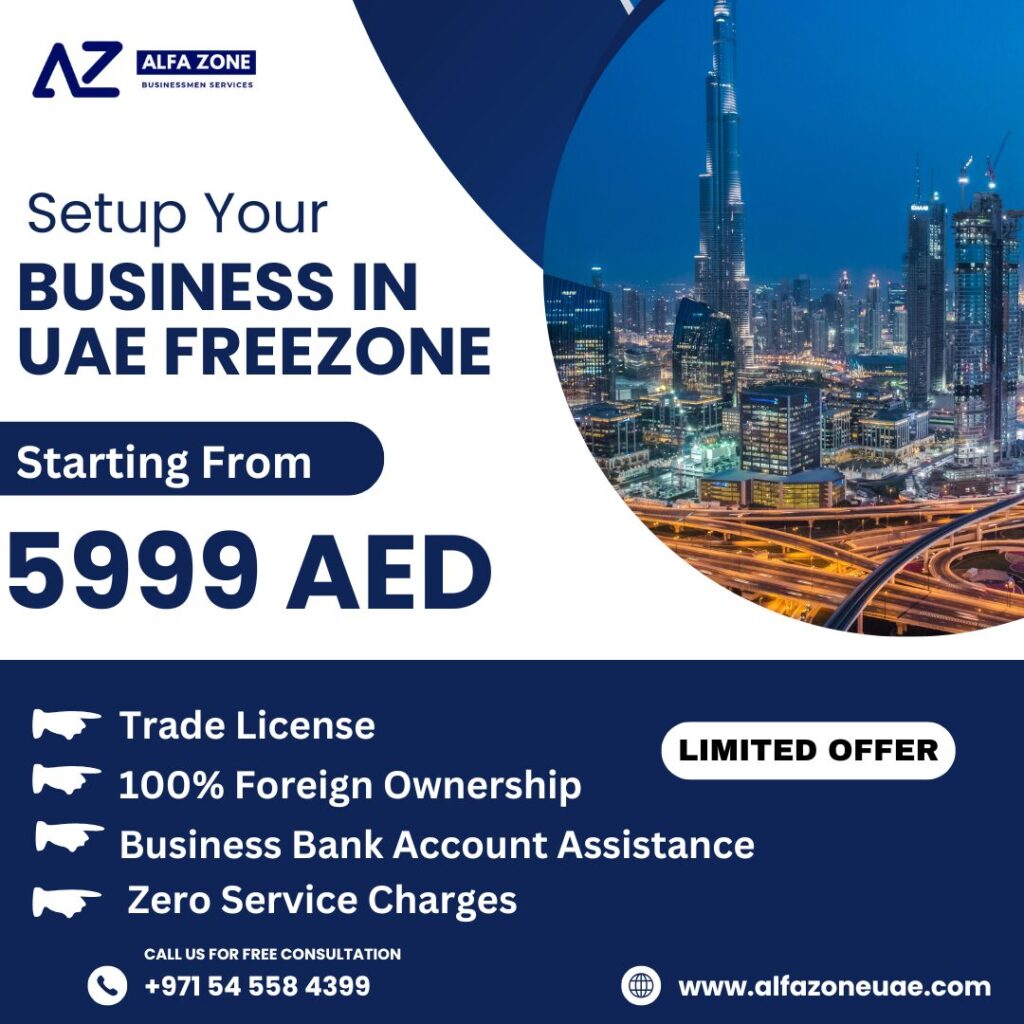How to Start a Gemstones Business in Dubai in 2025
Dubai stands as a global nexus for luxury goods, making it an ideal location to launch a gemstones business. With its strategic position bridging East and West, coupled with a tax-friendly environment and robust infrastructure, Dubai offers unparalleled opportunities for entrepreneurs in the gemstone sector. This article delves into the essential steps to establish a successful gemstones business in Dubai.
The city’s strategic location and business-friendly environment make it a prime destination for entrepreneurs aiming to enter the gemstones industry. Dubai’s position as a gemstone trade hub is reinforced by its state-of-the-art infrastructure, including the Dubai Multi Commodities Centre (DMCC), which facilitates seamless precious stones trading. The DMCC’s diamond exchange, for instance, is among the world’s most significant, hosting regular tenders and attracting global traders.
The UAE gemstone industry is experiencing robust growth. In 2023, the UAE gems and jewelry market was valued at USD 8.34 billion and is projected to grow at a CAGR of 6.84% through 2029. This growth is driven by increasing demand for precious stones, including diamonds, emeralds, sapphires, and rubies, particularly in the Middle East luxury market.
Moreover, Dubai’s reputation as a luxury shopping destination attracts a diverse and affluent consumer base, further bolstering the Dubai jewelry market. The city’s commitment to maintaining high standards in trade practices enhances its appeal to international investors and traders.
Embarking on a gemstones business in Dubai not only positions entrepreneurs at the heart of a thriving market but also offers access to a network of global trade connections. With the right business setup in Dubai, including obtaining necessary licenses and adhering to regulatory requirements, entrepreneurs can capitalize on the city’s dynamic market and strategic advantages.
In the following sections, we will explore the critical steps and considerations for establishing a successful gemstones business in Dubai, from understanding market dynamics to navigating legal frameworks and leveraging marketing strategies.

Also Read: How to Start a Coaching Business in Dubai
Check Out Our Easy Online Business Cost Calculator
Understanding the Gemstones Market in Dubai
The gemstones business in Dubai thrives due to the city’s reputation as a luxury shopping destination and its diverse, affluent population. High demand for diamonds, emeralds, sapphires, and rubies fuels a vibrant market. Understanding consumer preferences and market trends is crucial for success in this competitive landscape.
Dubai has emerged as a global gemstone trade hub, with the Dubai Multi Commodities Centre (DMCC) playing a pivotal role in this growth. In 2023, Dubai’s diamond trade reached $38.3 billion, positioning the city as one of the top diamond trading centers worldwide. The DMCC’s strategic initiatives and collaborations have significantly contributed to this expansion, fostering a robust ecosystem for precious stones trading.
The UAE’s diamond jewelry market is experiencing substantial growth, with revenues projected to increase from $1.31 billion in 2023 to $1.96 billion by 2030, reflecting a CAGR of 5.9%. This surge is driven by rising demand for both natural and lab-grown diamonds, as well as a growing preference for ethically sourced and sustainable jewelry options.
Colored gemstones are also gaining popularity in Dubai, with consumers seeking unique and personalized pieces. The city’s diverse population and cultural appreciation for vibrant jewelry contribute to this trend, making colored gemstones an attractive segment for entrepreneurs entering the market.
UAE jewelry trends indicate a shift towards sustainability and ethical sourcing. Consumers are increasingly prioritizing jewelry made with responsibly sourced materials, including recycled gold and conflict-free stones. Retailers are responding by obtaining certifications from organizations like the Responsible Jewelry Council (RJC) and promoting eco-friendly practices.
Digital transformation is another key trend shaping the UAE jewelry market. E-commerce platforms and social media channels are becoming essential for reaching tech-savvy consumers, particularly millennials and Gen Z. By 2025, it’s expected that 20% of jewelry sales in the GCC will occur online, emphasizing the importance of a strong digital presence for businesses.
For those considering a business setup in Dubai, understanding these market dynamics is crucial. The city’s strategic location, tax-friendly environment, and robust infrastructure make it an ideal destination for establishing a gemstones business. By aligning with current trends and consumer preferences, entrepreneurs can position themselves for success in Dubai’s thriving gemstones market.

Also Read: How to Add an Activity to your Trade License in Dubai
Check Out Our Easy Online Business Cost Calculator
Legal Framework and Licensing Requirements
Establishing a gemstones business in Dubai requires navigating a well-defined legal framework to ensure compliance and smooth operations. Understanding the licensing requirements and regulatory obligations is crucial for entrepreneurs aiming to tap into Dubai’s lucrative gemstone market.
Choosing the Right Jurisdiction
Dubai offers two primary jurisdictions for business setup: the Mainland and Free Zones. Each has its own set of regulations and benefits:
- Free Zones: Free Zones like the Dubai Multi Commodities Centre (DMCC) and Meydan Free Zone specialize in commodities trading, offering benefits such as 100% foreign ownership, tax exemptions, and simplified import-export procedures.
- Mainland: Businesses operating in the Mainland are licensed by the Department of Economy and Tourism (DET). This setup allows companies to trade directly within the local market and across the UAE. Recent reforms permit 100% foreign ownership in many sectors, including the gemstone trade.
Obtaining a Trade License
To legally operate, businesses must acquire a trade license specific to their activities:
- Final Submission: Submit all documents and pay the required fees to obtain the trade license.
- Select Business Activity: Identify the exact nature of your business, such as “Precious Metals and Stones Trading.”
- Reserve Trade Name: Choose a unique name and reserve it through the DET or relevant Free Zone authority.
- Initial Approval: Obtain preliminary approval for your business activity.
- Prepare Legal Documents: Draft the Memorandum of Association (MOA) and other necessary documents.
- Lease Agreement: Secure a physical office space and obtain a tenancy contract.
Compliance with UAE Regulations
Operating a gemstones business in Dubai entails adherence to specific regulations to maintain integrity and trust:
- Security Measures: Installation of security systems approved by the Security Industry Regulatory Agency (SIRA) is mandatory to safeguard high-value commodities.
- Anti-Money Laundering (AML) Compliance: Businesses dealing in precious metals and stones are classified as Designated Non-Financial Businesses and Professions (DNFBPs). They must implement AML measures, including customer due diligence, transaction monitoring, and reporting suspicious activities.
- Registration with GoAML: Firms must register with the Financial Intelligence Unit’s GoAML platform to report any suspicious transactions.
Business Setup in Dubai: Key Considerations
When planning your business setup in Dubai, consider the following:
- Cost Implications: The cost of obtaining a trade license varies based on the chosen jurisdiction, business activity, and other factors. For instance, establishing a precious metals and gems trading license in the Mainland typically starts at AED 28,040.
- Legal Structure: Decide on the appropriate legal structure, such as a Limited Liability Company (LLC) or Sole Establishment, based on your business needs and ownership preferences.
- Local Sponsorship: While recent reforms have eased foreign ownership restrictions, certain business activities may still require a local sponsor or service agent.
In conclusion, launching a gemstones business in Dubai involves meticulous planning and compliance with the UAE’s commercial regulations. By understanding the legal framework and fulfilling licensing requirements, entrepreneurs can establish a reputable and successful presence in Dubai’s vibrant gemstone market.
Also Read: How to Start a Coaching Business in Dubai
Check Out Our Easy Online Business Cost Calculator
Choosing the Right Business Structure
Selecting the appropriate business structure is a pivotal decision when establishing a gemstones business in Dubai. The chosen structure influences liability, taxation, operational flexibility, and the overall trajectory of your enterprise. Dubai offers several business ownership structures, each with distinct advantages and considerations.
Sole Proprietorship
A sole proprietorship in Dubai is the simplest form of business ownership, where a single individual owns and operates the business. This structure grants complete control over decision-making and profits. However, the owner bears unlimited liability, meaning personal assets are at risk in case of business debts or legal issues. This model is often suitable for small-scale operations or consultants in the gemstones sector.
Limited Liability Company (LLC)
Forming a Limited Liability Company (LLC) is a popular choice for entrepreneurs in the UAE. An LLC provides limited liability protection, separating personal assets from business liabilities. It allows for multiple shareholders and offers flexibility in management and profit distribution. Recent reforms have enabled 100% foreign ownership in many sectors, including the gemstones industry, making LLC formation more accessible to international investors.
Free Zone Company
Establishing a Free Zone company is advantageous for businesses focusing on international trade. Free Zones like the Dubai Multi Commodities Centre (DMCC) offer benefits such as 100% foreign ownership, tax exemptions, and simplified import-export procedures. This setup is ideal for gemstones businesses aiming to operate globally without engaging directly in the UAE mainland market.
Partnership Agreements
Entering into a partnership agreement involves two or more individuals or entities collaborating to conduct business. Partnerships can be general or limited, with varying degrees of liability and involvement. It’s crucial to have a well-drafted partnership agreement outlining roles, responsibilities, profit-sharing, and procedures for dispute resolution. Such agreements ensure clarity and protect the interests of all parties involved in the gemstones business.
Considerations for Business Setup in Dubai
When deciding on the appropriate structure for your gemstones business in Dubai, consider the following:
- Liability: Assess your willingness to assume personal liability versus seeking protection through limited liability structures.
- Ownership: Determine if you prefer sole ownership or are open to partnerships or shareholder arrangements.
- Market Access: Decide whether your focus is on the UAE mainland market or international trade, influencing the choice between mainland and Free Zone setups.
- Capital Requirements: Evaluate the initial investment and ongoing operational costs associated with each structure.
- Regulatory Compliance: Ensure understanding and adherence to UAE commercial regulations pertinent to your chosen structure.
In conclusion, selecting the right business structure is fundamental to the success of your gemstones business in Dubai. Careful consideration of liability, ownership preferences, market focus, and regulatory requirements will guide you in making an informed decision that aligns with your business objectives.
Also Read: Do You Need a Business License to Sell on Amazon UAE
Check Out Our Easy Online Business Cost Calculator
Selecting the Optimal Location: Mainland vs. Free Zones
Choosing the right location is a pivotal decision when establishing a gemstones business in Dubai. The choice between setting up in the Mainland or a Free Zone significantly impacts ownership rights, tax obligations, and market access. Understanding the nuances of each option is essential for aligning your business strategy with Dubai’s dynamic economic landscape.
Dubai Mainland Business
Setting up your gemstones business in Dubai Mainland offers direct access to the UAE’s extensive domestic market. Mainland companies are licensed by the Department of Economic Development (DED) and can operate across all Emirates without restrictions.
Key Features:
- Market Access: Operate freely within the UAE and internationally, engaging directly with consumers and businesses.
- Ownership: Recent reforms allow 100% foreign ownership in many sectors, including trading activities, eliminating the need for a local sponsor.
- Business Activities: Access to over 3,000 business activities approved by the DED, providing flexibility to diversify offerings.
- Government Contracts: Eligibility to bid for government projects and contracts, expanding business opportunities.
Considerations:
- Regulatory Compliance: Adherence to UAE commercial laws and regulations, including VAT registration if annual turnover exceeds AED 375,000.
- Taxation: Mainland companies are subject to a 9% corporate tax on profits exceeding AED 375,000, as per Federal Decree-Law No. 47 of 2022.
- Office Space: Mandatory requirement to lease physical office space, which can increase operational costs.
Free Zone Benefits
Alternatively, establishing your gemstones business in Dubai within a Free Zone offers a range of incentives designed to attract foreign investment. The Dubai Multi Commodities Centre (DMCC) Free Zone is particularly renowned for commodities trading, including precious stones.
Key Features:
- 100% Foreign Ownership: Full ownership without the need for a local partner, providing complete control over business operations.
- Tax Incentives: Enjoy 0% corporate and personal income tax for up to 50 years, along with 100% capital and profit repatriation.
- Simplified Setup: Streamlined registration processes, with access to modern infrastructure and business support services.
- Strategic Location: Situated in Jumeirah Lakes Towers, DMCC offers proximity to major transport hubs and business districts.
Considerations:
- Regulatory Framework: Compliance with Free Zone authority regulations, which may differ from mainland requirements.
- Market Restrictions: Free Zone companies are generally restricted to operating within the Free Zone or internationally. To trade directly within the UAE market, additional licensing or establishing a mainland branch may be required.
- Office Requirements: Obligation to lease office space within the Free Zone, which may have specific size and location criteria.
Business Location Strategy
When determining the optimal location for your gemstones business in Dubai, consider the following strategic factors:
- Target Market: If your primary clientele is within the UAE, a Mainland setup offers unrestricted access. For international trading, a Free Zone may be more advantageous.
- Ownership Preferences: Desire for full foreign ownership aligns with Free Zone benefits, while Mainland options now also offer this in many sectors.
- Cost Implications: Evaluate the total cost of setup, including licensing fees, office rentals, and ongoing operational expenses.
- Regulatory Compliance: Assess the regulatory environment and ensure alignment with your business model and activities.
In conclusion, both Mainland and Free Zone setups offer unique advantages for establishing a gemstones business in Dubai. Your choice should align with your business objectives, target market, and operational preferences. Careful consideration of these factors will position your venture for success in Dubai’s vibrant gemstone industry.
Also Read: How to Get a Typing Center License in Dubai
Check Out Our Easy Online Business Cost Calculator
Navigating Import and Export Regulations
Efficiently importing and exporting gemstones requires adherence to UAE customs regulations. Understanding documentation requirements, tariffs, and inspection processes ensures timely and legal movement of goods, vital for the success of your gemstones business in Dubai.
Understanding UAE Customs Procedures
The UAE’s customs framework is governed by the GCC Common Customs Law, ensuring standardized procedures across member states. For a gemstones business in Dubai, compliance with these regulations is crucial for smooth operations.
Key Import Procedures:
- Inspection and Clearance: Goods are subject to inspection to verify compliance with regulations before clearance is granted.
- Customs Registration: Businesses must register with Dubai Customs to obtain an importer code, enabling legal import activities.
- Documentation: Essential documents include the commercial invoice, certificate of origin, packing list, and the bill of lading or airway bill, depending on the mode of transport.
- Customs Declaration: A detailed declaration form must be submitted, outlining the nature, quantity, and value of the gemstones.
Gemstone Import Duties and Taxes
Importing gemstones into Dubai involves specific duties and taxes:
- Exemptions: Companies operating in Free Zones may benefit from customs duty exemptions, provided the goods are not intended for the UAE mainland market.
- Customs Duty: A standard 5% duty is levied on most imported goods, calculated based on the CIF (Cost, Insurance, and Freight) value.
- Value-Added Tax (VAT): A 5% VAT applies to the import of gemstones, with certain exemptions available for businesses operating within Free Zones.
Export Documentation and Compliance
For a gemstones business in Dubai engaged in exports, meticulous documentation ensures compliance and facilitates international trade:
- Customs Clearance: Upon verification of documents and inspection, customs clearance is granted, allowing the goods to be shipped internationally.
- Export Declaration: Submission of an export declaration form to Dubai Customs is mandatory.
- Supporting Documents: These include the commercial invoice, packing list, certificate of origin, and the relevant transport document (bill of lading or airway bill).
Ensuring Trade Compliance
Adherence to trade compliance is vital for the legitimacy and reputation of your gemstones business in Dubai:
- Licensing: Ensure that your business holds the appropriate licenses for trading in gemstones, as mandated by the Department of Economic Development (DED) or relevant Free Zone authorities.
- Anti-Money Laundering (AML) Regulations: Businesses dealing with precious stones must comply with AML regulations, including registering with the Ministry of Economy and implementing due diligence measures.
- Security Approvals: Obtain necessary approvals from the Security Industry Regulatory Agency (SIRA) and Dubai Police for the installation of security systems within your establishment.
In conclusion, navigating import and export regulations is a critical component of establishing a successful gemstones business in Dubai. By understanding and adhering to UAE customs procedures, fulfilling documentation requirements, and ensuring compliance with trade regulations, businesses can operate efficiently and capitalize on Dubai’s strategic position in the global gemstone market.

Also Read: How to Start a Food Delivery Service Business in Dubai, UAE?
Check Out Our Easy Online Business Cost Calculator
Establishing a Reliable Supply Chain
Building a trustworthy supply chain is foundational for a gemstones business in Dubai. Partnering with reputable suppliers, ensuring ethical sourcing, and maintaining quality control are essential steps to meet customer expectations and regulatory standards.
Gemstone Sourcing and Supplier Networks
Dubai’s strategic position as a global trade hub offers access to a vast network of gemstone suppliers. Establishing relationships with reputable suppliers is crucial for ensuring the authenticity and quality of gemstones. Engaging with suppliers who prioritize ethical mining practices and transparency can enhance the credibility of your business.
Also Read: List of Free Zones in Dubai, UAE
Ethical Mining Practices
Incorporating ethical mining practices into your supply chain is not only a moral imperative but also a business advantage. Ethical sourcing involves obtaining gemstones through methods that respect human rights, labor laws, and environmental sustainability. This approach ensures that your gemstones business in Dubai aligns with global standards and meets the expectations of socially conscious consumers.
Supply Chain Management
Effective supply chain management is vital for maintaining the integrity and efficiency of your operations. Implementing robust systems to track the movement of gemstones from source to sale helps in ensuring quality control and timely delivery. Utilizing technology for inventory logistics can streamline processes, reduce errors, and enhance customer satisfaction.
Inventory Logistics
Managing inventory effectively is essential for meeting market demand and minimizing costs. Implementing inventory management systems allows for real-time tracking of stock levels, forecasting demand, and optimizing storage. This level of control supports the scalability of your gemstones business in Dubai and ensures readiness to capitalize on market opportunities.
In conclusion, establishing a reliable supply chain involves strategic sourcing, ethical practices, efficient management, and effective logistics. By focusing on these areas, your gemstones business in Dubai can build a strong foundation for long-term success and contribute positively to the global gemstone industry.
Also Read: Trade License in Dubai : Cost & Step Involved
Check Out Our Easy Online Business Cost Calculator
Marketing Strategies for the Gemstones Business
Effective marketing propels your gemstones business in Dubai to prominence. Utilizing digital platforms, crafting a compelling brand narrative, and engaging with target demographics through tailored campaigns can drive sales and establish brand loyalty.
Embracing Digital Marketing in Dubai
Dubai’s tech-savvy population and high internet penetration make digital marketing a cornerstone for luxury brands. Implementing strategies such as search engine optimization (SEO), pay-per-click (PPC) advertising, and email marketing can enhance online visibility. Tailoring content to resonate with local and international audiences ensures broader reach and engagement.
Crafting a Luxury Branding Narrative
In the luxury market, storytelling is paramount. Developing a brand narrative that highlights the uniqueness, craftsmanship, and heritage of your gemstones can differentiate your business. Consistent visual identity, including logos, color schemes, and packaging, reinforces brand recognition and appeals to discerning customers.
Leveraging Social Media Outreach
Social media platforms like Instagram, Facebook, and LinkedIn offer avenues to showcase your gemstone collections and connect with potential clients. Regularly posting high-quality images, behind-the-scenes content, and customer testimonials can foster community and trust. Collaborating with influencers and industry experts can further amplify your brand’s reach.
Enhancing Customer Engagement
Building strong relationships with customers is vital. Implementing loyalty programs, personalized communication, and exceptional after-sales service can enhance customer satisfaction and retention. Hosting exclusive events or previews for loyal clients can create a sense of exclusivity and appreciation.
Implementing Market Segmentation
Understanding your target market segments allows for tailored marketing efforts. Segmenting based on demographics, purchasing behavior, and preferences enables the creation of personalized campaigns that resonate with specific groups. This targeted approach can lead to higher conversion rates and customer loyalty.
In conclusion, a comprehensive marketing strategy encompassing digital marketing, luxury branding, social media outreach, customer engagement, and market segmentation is essential for the success of your gemstones business in Dubai. By aligning these strategies with the unique aspects of the Dubai market, your business can thrive and establish a strong presence in the luxury gemstone industry.
Also Read: 5 Best Banks in UAE for Business Accounts
Check Out Our Easy Online Business Cost Calculator
Financial Planning and Investment Considerations
Sound financial planning underpins the sustainability of your gemstones business in Dubai. Assessing startup costs, projecting revenues, and exploring funding avenues are critical steps to ensure profitability and long-term growth.
Estimating Startup Capital
Launching a gemstones business in Dubai requires careful budgeting. Initial costs typically include trade licensing, office or retail space, inventory procurement, and marketing. Depending on the business model and location, startup capital can range from AED 34,000 to AED 60,000. For instance, trade licenses vary: Mainland licenses start around AED 12,000, while Free Zone licenses begin at AED 10,000. Additional expenses encompass visa fees, customs codes for import/export, and initial inventory investments.
Strategic Investment Planning
Developing robust investment strategies is crucial. This involves allocating funds efficiently across operations, marketing, and inventory. Given the dynamic nature of the gemstone market, diversifying investments can mitigate risks. For example, considering both natural and lab-grown diamonds can cater to varying consumer preferences and price points.
Financial Forecasting and Cost Analysis
Accurate financial forecasting enables better decision-making. Projecting revenues based on market trends and consumer behavior helps in setting realistic goals. Conducting thorough cost analysis ensures that all expenses, from procurement to marketing, are accounted for. This comprehensive approach aids in identifying potential financial challenges and opportunities for cost optimization.
Exploring Funding Options
Securing adequate funding is pivotal for establishing and expanding your gemstones business in Dubai. Various funding options are available:
- Bank Loans: Traditional financing through banks requires a solid business plan and credit history.
- Venture Capital and Angel Investors: These investors provide capital in exchange for equity, often bringing industry expertise.
- Government Grants and Programs: Initiatives like the Khalifa Fund offer financial support to startups and SMEs.
- Business Incubators: These provide not only funding but also mentorship and resources to budding entrepreneurs.
Selecting the appropriate funding avenue depends on your business model, growth plans, and financial requirements.
Integrating Financial Planning into Business Setup
Incorporating financial planning into your business setup in Dubai ensures a solid foundation. Aligning your financial strategies with legal and operational frameworks facilitates smoother operations and scalability. Engaging with financial advisors or consultants can provide insights tailored to the gemstone industry’s nuances.
In summary, meticulous financial planning, encompassing startup capital estimation, strategic investments, comprehensive forecasting, and exploring diverse funding options, is essential for the success of your gemstones business in Dubai. By proactively managing financial aspects, you position your business for sustainable growth in Dubai’s vibrant gemstone market.
Also Read: 5 Best Banks in UAE for Business Accounts
Check Out Our Easy Online Business Cost Calculator
Understanding Taxation and VAT Implications
Navigating the tax landscape is essential for compliance and financial efficiency. While Dubai offers tax advantages, understanding Value Added Tax (VAT) obligations and potential exemptions is crucial for your gemstones business in Dubai.
UAE Tax Policy Overview
The United Arab Emirates (UAE) has long been recognized for its favorable tax environment. However, recent developments have introduced new tax considerations for businesses. As of June 1, 2023, the UAE implemented a federal corporate tax to diversify its economy and align with international tax standards. The corporate tax rates are as follows:
- 0% for taxable income up to AED 375,000
- 9% for taxable income exceeding AED 375,000
- 15% for large multinational corporations meeting specific criteria under the OECD’s regulations
These rates apply to UAE-incorporated companies, natural persons conducting specified business activities, and non-resident juridical persons with a permanent establishment in the UAE.
VAT Registration and Compliance
The UAE imposes a standard VAT rate of 5% on most goods and services. Businesses with an annual taxable turnover exceeding AED 375,000 are required to register for VAT. Those with turnovers above AED 187,500 may opt for voluntary registration. VAT-registered businesses must file periodic returns, reporting both output VAT (charged on sales) and input VAT (paid on purchases).
For your gemstones business in Dubai, VAT registration ensures legal compliance and allows for the recovery of input VAT on business expenses, enhancing financial efficiency.
Tax Exemptions and Zero-Rated Supplies
Certain sectors in the UAE benefit from VAT exemptions or zero-rated supplies. VAT-exempt sectors include specific financial services, residential property rentals, and local passenger transport. Zero-rated supplies, taxed at 0%, encompass exports and international transportation services. While your gemstones business in Dubai may not fall under these categories, understanding these distinctions is vital for accurate financial planning.
Ensuring Financial Compliance
Maintaining financial compliance involves diligent record-keeping and timely tax filings. Businesses must retain detailed records, including invoices, contracts, and accounting information, for a minimum of five years. Non-compliance can result in penalties and disrupt business operations.
Integrating tax planning into your business setup in Dubai is crucial. Consulting with tax professionals can provide tailored strategies to navigate the UAE’s tax landscape effectively.
In summary, understanding and adhering to UAE tax policies, VAT registration requirements, and financial compliance standards are essential for the success and sustainability of your gemstones business in Dubai.
Also Read: 5 Best Banks in UAE for Business Accounts
Check Out Our Easy Online Business Cost Calculator
Cultural Sensitivity and Business Etiquette
Respecting cultural norms and practicing appropriate business etiquette fosters strong relationships and trust. Being aware of local customs, communication styles, and professional expectations enhances the reputation of your gemstones business in Dubai.
Understanding UAE Business Culture
The United Arab Emirates (UAE) operates within a framework influenced by Islamic traditions and values. Approximately 80% of the population is Muslim, and Islamic principles permeate various aspects of life, including business practices. Emiratis often prefer to engage in business with individuals they know and trust, making relationship-building a cornerstone of successful business endeavors.
Effective Communication and Negotiation Practices
In the UAE, communication tends to be formal and respectful. It’s customary to address individuals using their honorific titles, such as “Mr.” or “Ms.” Initial meetings often begin with small talk, focusing on personal well-being and family, before transitioning to business discussions.
Negotiations may proceed at a deliberate pace, emphasizing consensus and mutual respect. It’s advisable to avoid aggressive or confrontational tactics, as Emiratis value harmony in business dealings.
Professional Conduct and Client Relations
Demonstrating professionalism is paramount. Punctuality is highly regarded, and arriving late to meetings can be perceived as disrespectful. Maintaining a respectful and diplomatic tone during conversations is essential, as Emiratis appreciate courteous and considerate communication styles.
Building trust through consistent and ethical behavior is crucial. Providing high-quality products and services, honoring commitments, and showing genuine interest in clients’ needs can strengthen relationships and foster long-term partnerships.
Gift-Giving and Social Etiquette
Gift-giving is a common practice in the UAE business culture. Presenting or receiving gifts with the right hand or both hands signifies respect and sincerity. It’s customary to wait until the giver has left before opening a gift, underscoring the importance of privacy and personal connection associated with the act of giving and receiving gifts.
During the Holy Month of Ramadan, working hours are typically reduced, and business operations may slow down. It’s advisable to schedule major business events and meetings outside this period to accommodate the cultural observances of your counterparts.
Incorporating cultural sensitivity and adhering to business etiquette in your business setup in Dubai can significantly enhance your reputation and success. By respecting local customs, communicating effectively, and demonstrating professionalism, you can build strong, lasting relationships in the UAE’s dynamic business environment.
Also Read: 5 Best Banks in UAE for Business Accounts
Check Out Our Easy Online Business Cost Calculator
Conclusion: Launching Your Gemstones Business in Dubai
Embarking on the journey to establish a gemstones business in Dubai presents exciting opportunities. By understanding the market, complying with legal requirements, and implementing strategic planning, entrepreneurs can position themselves for success in this dynamic industry.
Dubai’s status as a global hub for luxury goods, coupled with its strategic location and business-friendly environment, makes it an ideal destination for gemstone entrepreneurs. The city’s robust infrastructure, tax incentives, and access to international markets provide a solid foundation for business growth.
To ensure a successful launch, consider the following business launch checklist:
- Market Research: Analyze the UAE’s gemstone market trends, including consumer preferences and demand for various precious stones.
- Legal Compliance: Obtain the necessary trade licenses and ensure adherence to UAE commercial regulations.
- Business Structure: Choose the appropriate business structure, such as a sole proprietorship, LLC, or Free Zone entity, based on your operational needs.
- Location Selection: Decide between setting up in Dubai Mainland or a Free Zone, considering factors like ownership rights and market access.
- Supply Chain Management: Establish relationships with reliable suppliers and understand import/export regulations to facilitate smooth operations.
- Marketing Strategy: Develop a comprehensive marketing plan to reach your target audience and build brand awareness.
By meticulously following this checklist, entrepreneurs can navigate the complexities of business setup in Dubai and position their ventures for long-term success.
In conclusion, launching a gemstones business in Dubai requires careful planning, market insight, and adherence to legal frameworks. With the right strategies and a clear understanding of the Dubai business landscape, entrepreneurs can tap into the city’s lucrative gemstone market and achieve entrepreneurial success.
Also Read: How to Start a Nightclub in Dubai
Check Out Our Easy Online Business Cost Calculator
Frequently Asked Questions (FAQs) on How to Start a Gemstones Business in Dubai
Dubai offers a strategic location, a thriving luxury market, 100% foreign ownership in certain zones, and a supportive regulatory environment, making it an attractive destination for gemstone trading.
You can apply for a trade license under the “Jewellery Trading” activity code 4773.11 through the Department of Economic Development (DED) or a relevant Free Zone authority like the Dubai Multi Commodities Centre (DMCC).
Costs vary based on location and business model. Mainland setups may start around AED 12,000, while Free Zone licenses can begin at AED 10,000. Additional expenses include visas, office space, and inventory.
Yes, in Free Zones like DMCC, foreign investors can own 100% of their business, granting full control.
DMCC is a Free Zone in Dubai that provides infrastructure, regulatory support, and networking opportunities for businesses in commodities trading, including gemstones.
Free Zones offer benefits like 100% foreign ownership, tax exemptions, simplified import/export procedures, and modern infrastructure.
Mainland setups provide broader market access within the UAE, allowing businesses to trade directly with the local market without restrictions.
Loose diamonds are duty-free, while loose colored gemstones are subject to a 5% duty on the CIF (Cost, Insurance, and Freight) value.
As of January 1, 2025, the UAE introduced a reverse charge mechanism for VAT on precious metals and gemstones, simplifying tax processes and reducing fraud.
If your taxable supplies exceed AED 375,000 annually, VAT registration is mandatory. Voluntary registration is available for businesses with supplies above AED 187,500.
Documents include your trade license, passport or Emirates ID of the manager/owner, and proof of authorization for the authorized signatory.
Importing gemstones requires compliance with UAE customs regulations, including obtaining necessary trade licenses, submitting import declarations, and paying applicable duties.
Certain sectors benefit from VAT exemptions or zero-rated supplies, such as exports and international transportation services. However, gemstones may not fall under these categories.
Building a trustworthy supply chain involves partnering with reputable suppliers, ensuring ethical sourcing, and maintaining quality control to meet customer expectations and regulatory standards.
Consider factors like ownership rights, tax obligations, market access, and proximity to suppliers and customers when choosing between Mainland and Free Zone setups.
UAE business culture emphasizes respect, formality, and relationship-building. Understanding local customs, communication styles, and professional expectations enhances business success.
Negotiations in the UAE are often conducted with a focus on building trust and mutual respect. It’s advisable to be patient, avoid aggressive tactics, and engage in polite small talk before discussing business matters.
During the Holy Month of Ramadan, working hours are typically reduced, and business operations may slow down. It’s advisable to schedule major business events and meetings outside this period.
Yes, gift-giving is a common practice. Presenting or receiving gifts with the right hand or both hands signifies respect and sincerity. It’s customary to wait until the giver has left before opening a gift.
Startup costs can range from AED 34,000 to AED 60,000, depending on the business model and location. This includes trade licensing, office or retail space, inventory procurement, and marketing.
Certain sectors in the UAE benefit from VAT exemptions or zero-rated supplies. However, gemstones may not fall under these categories, and businesses should comply with standard VAT regulations.
Maintaining financial compliance involves diligent record-keeping, timely tax filings, and adherence to UAE tax policies and VAT registration requirements.
Free Zones offer benefits like 100% foreign ownership, tax exemptions, simplified import/export procedures, and modern infrastructure.
Mainland setups provide broader market access within the UAE, allowing businesses to trade directly with the local market without restrictions.
Building a trustworthy supply chain involves partnering with reputable suppliers, ensuring ethical sourcing, and maintaining quality control to meet customer expectations and regulatory standards.
Consider factors like ownership rights, tax obligations, market access, and proximity to suppliers and customers when choosing between Mainland and Free Zone setups.
UAE business culture emphasizes respect, formality, and relationship-building. Understanding local customs, communication styles, and professional expectations enhances business success.
Negotiations in the UAE are often conducted with a focus on building trust and mutual respect. It’s advisable to be patient, avoid aggressive tactics, and engage in polite small talk before discussing business matters.
During the Holy Month of Ramadan, working hours are typically reduced, and business operations may slow down. It’s advisable to schedule major business events and meetings outside this period.
Yes, gift-giving is a common practice. Presenting or receiving gifts with the right hand or both hands signifies respect and sincerity. It’s customary to wait until the giver has left before opening a gift.
For more information, visit Alfa Zone.
You May Also Find This Article Useful: Starting Mobile Car Wash Business in Dubai: License & Cost Estimate
Tags:
Jewellery Trading License Dubai, Gemstone business in Dubai, Gemstones business in UAE, DMCC Free Zone, Gemstones Business in Dubai, Business Setup in Dubai, Mainland Company Formation, Pearls & Precious Stones Trading, Meydan Free Zone, UAE Customs Procedures, Gemstone Import Duties, Export Documentation Dubai, Trade Compliance UAE, International Shipping Regulations, Gemstone Sourcing, Supplier Networks, Ethical Mining Practices, Supply Chain Management, Inventory Logistics, Digital Marketing Dubai, Luxury Branding, Social Media Outreach, Customer Engagement, Market Segmentation, Startup Capital, Investment Strategies, Financial Forecasting, Cost Analysis, Funding Options, UAE Tax Policy, VAT Registration, Tax Exemptions, Financial Compliance, Corporate Taxation
















Comments are closed